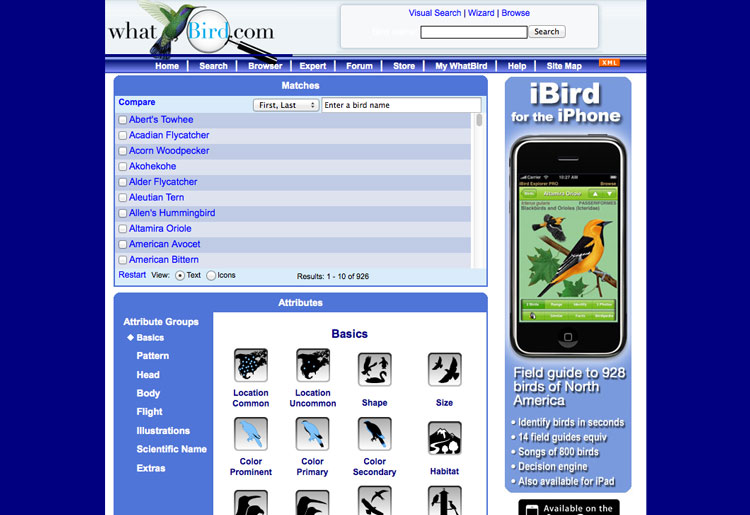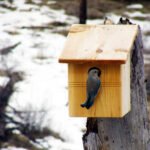Anyone who’s a birdwatcher has gone through the frustrating experience of being unable to ID a bird because he or she didn’t have a bird guide nearby or simply couldn’t find the bird in it.
Fortunately, the Internet is a remarkable resource for nearly anything, and it’s made identifying birds much easier than flipping through pages of a huge ID book (many, of course, still find books easier).
While there are a lot of useful birding apps out there that make this process significantly easier, these are the best websites that anyone with a computer can turn to for help identifying a bird.
WhatBird
 search section of WhatBird, you’ll be able to narrow down the bird you’ve possibly seen by selecting noticeable attributes. The interface is not as friendly or interactive as I would like, but it’s very effective and pretty easy to use. The creator of WhatBird is also the creator of the iBird app for smartphones and tablets, which is much better if you have access to the app.
search section of WhatBird, you’ll be able to narrow down the bird you’ve possibly seen by selecting noticeable attributes. The interface is not as friendly or interactive as I would like, but it’s very effective and pretty easy to use. The creator of WhatBird is also the creator of the iBird app for smartphones and tablets, which is much better if you have access to the app.National Geographic Backyard Bird Identifier
 Facebook page for the heads up about this site). One of the weaknesses of this site is that it is confined to backyard birds, so some warblers and other non-backyard birds (that you could potentially spot) aren’t present.
Facebook page for the heads up about this site). One of the weaknesses of this site is that it is confined to backyard birds, so some warblers and other non-backyard birds (that you could potentially spot) aren’t present.
All About Birds

This is Cornell Lab of Ornithology’s bird headquarters. In the Bird Guide at All About Birds, it’s easy to search for and learn more about birds of North America. The best way to search for birds you might have seen in the field is to browse by name and shape and click on the profile the bird looked like. The database includes 584 out of about 700 regularly occurring North American species, so they’re likely to have your bird.
Cornell is also in the process of creating a true bird ID guide for the site called Merlin. It seems like it could be one of the most advanced bird guides out there because it will utilize artificial intelligence as well as information gathered from real birders. If you’re interested in helping, you can check it out here.
Google Images

If none of these sites are catch your eye, simply doing a Google Images search with a brief description of the bird you saw will yield great results. For example, if you type in “large woodpecker with red mohawk,” you’ll immediately get the image of a pileated woodpecker. This is also helpful for more complicated birds, though it can sometimes give results that are less than helpful. Another useful aspect of Google Images, which Stennie Meadours pointed out on the Facebook page, is that you can see different plumage and pictures of birds you think it could be.
Facebook Pages

Yet another option is to head over to a Facebook page popular with birders and ask for help. Usually, pictures are helpful, if not necessary. A few of the pages include Audubon Society, Cornell Lab of Ornithology and, yours truly, Backyard Chirper. Even though we might not be able to respond to some of the requests for bird ID, one of our fantastic fans will usually help out.
Let us know if you know of any other sites that are helpful.

 search section of WhatBird, you’ll be able to narrow down the bird you’ve possibly seen by selecting noticeable attributes. The interface is not as friendly or interactive as I would like, but it’s very effective and pretty easy to use. The creator of WhatBird is also the creator of the iBird app for smartphones and tablets, which is much better if you have access to the app.
search section of WhatBird, you’ll be able to narrow down the bird you’ve possibly seen by selecting noticeable attributes. The interface is not as friendly or interactive as I would like, but it’s very effective and pretty easy to use. The creator of WhatBird is also the creator of the iBird app for smartphones and tablets, which is much better if you have access to the app.


3 Comments
Thanks for the hat tip, and for posting a collection of bird identification sites! I’ve found them really useful and I’ve shared a few of them with my other bird-minded friends. 🙂
Thanks Margaret. And do let us know if you find a previously unknown species 😉
I think this is the best bird identification collection site I have ever seen. If you can’t find it on one of these sites maybe you’ve found a previously unknown species.